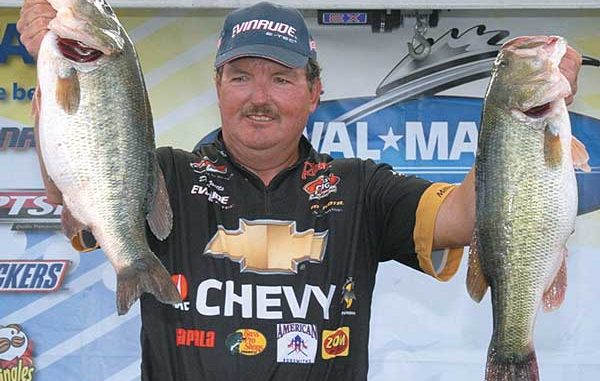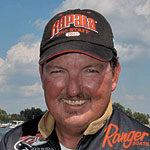
Between two deer-hunting trips to Canada this past November, I fished the best lake I’ve ever been on.
And I was as surprised as anybody. It was just unbelievable.
The FLW Series’ East-West Fish-Off was held at Falcon Lake, a 98,000-acre reservoir of the Rio Grande River at the Texas-Mexico border. The tournament lasted three days, and I caught the two biggest stringers of my tournament career the first two days.
On the first day, my five biggest fish weighed 37 pounds, 2 ounces. On the second day, my five biggest fish weighed 33 pounds, 7 ounces. I didn’t have as good a day the third day and wound up third. My three-day catch was 89-15.
Without a doubt, I’ve never fished a lake like Falcon. If anyone in North Carolina wants to take the bass-fishing trip of a lifetime, it would be a great place to go. I have never heard of another lake this good in the United States.
I think a handful of factors turned Falcon into the most tremendous bass fishery in the country.
• First, the lake is stocked with Florida-strain largemouths that grow bigger than the bass native to N.C. lakes.
• Second, in south Texas, it stays warm most of the year, so the bass have a longer growing season. You can go in January, and there’ll be a good chance that you’ll be fishing in 70- to 80-degree weather.
• Third, there are so many bushes in the water. The water was down 24 feet earlier in the year, but when we got there, it had come up 30 feet.
We were actually fishing 5 feet above full pool, and bushes in the water were anywhere from 0- to 25-feet deep. Farther out the lake has standing timber.
• Fourth, the lake is full of tilapia, a baitfish most fishermen in North Carolina have ever heard of. Almost any of the lakes that grow those really big fish have tilapia.
Bass that feed on them get big— like the bass in Southern California that eat rainbow trout.
I’m sure I had a bass on the second day of the tournament that would have gone over 12 pounds. Shoot, I caught a 9 1/2-pounder, and that fish wasn’t half the fish this one was.
My big limit the first day broke the all-time record for biggest single-day weight at an FLW event. And it didn’t last a day.
Greg Hackney of Louisiana broke it the second day with 39-11. He wound up with almost 110 pounds pounds for three days, and Terry Bolton finished second with 105-1/2 pounds. The biggest fish caught was over 12 pounds, and there were probably 20 or 30 fish caught over 9 pounds.
The observer who was in my boat the second day counted (and didn’t tell me until the morning of the third day) I caught 42 fish that weighed 5 pounds or more that day. And I lost that big fish, and had an 8 1/2 jump off at the boat and another one bigger just pull off.
The bass were so big and so powerful, they were hard to get in the boat. I was having to do things I don’t usually do. I almost never use line heavier than 10-pound test, but I had to go to 14-pound Sufix Elite. I’ve probably used 14-pound test on a crankbait rod once before in my life, but you needed it to fight those fish.
I had to do a lot of things I’m not used to doing — but dozens of 7- and 8- and 9-pound fish will do that to you.
What I was doing was cranking the tops of bushes that were underwater. There were millions of bushes, but you had to find the right ones. When you did, all of the fish would be there.
The second day, I pretty much caught my 33 pounds on five casts at one bush. The first day, I hit a lot more spots. I’d catch two off a bush and move, then catch two off the next bush and move. I fished that way for a while.
And these weights were coming in November. If you came back in February, when they’d be full of eggs, ready to spawn, it would be amazing. There would be thousands of 10-pound fish.
Here’s one thing that was really neat. I had never seen this lake before I came down for practice a week or so before the tournament. It reminded me a little bit of High Rock Lake, the way it was laid out and the way the structure was located, so I just fished it the way I’d fish High Rock.
I used the same tackle — the same American RodSmith cranking rod and Bass Pro Shops reels, and I caught most of my fish on a Rapala DT-14 crankbait.
If you take a trip to Falcon, you’ll need a handful of big spinnerbaits, a few jigs, lots of DTs and plenty of big Zoom worms.
There’s nothing special about the way the lake looks. I’d say the clarity was even like High Rock — I could see my baits about 2 1/2 feet down.
But what was in the water was really special.
David Fritts is a 52-year-old professional bass fisherman from Lexington. He won the Bassmasters Classic in 1993, the BASS Angler of the Year in 1994 and the FLW Tour Championship in 1997. He is sponsored by Ranger boats, Evinrude outboards, Rapala, Zoom, Chevy trucks, VMC hooks, American RodSmith rods and Bass Pro Shops.




Be the first to comment